The Community Fund for Women & Girls
Disrupting Gender Inequity (RECORDED)
Presented in partnership with Aurora Women and Girls Foundation, CTData Collaborative and CT Public
Date
Nov 14, 2023
Time
6:00 p.m. to 7:30 p.m.
Location
Quinnipiac University, Mt. Carmel Auditorium, 275 Mt. Carmel Ave., Hamden CT 06518
Presenter(s)
Dr. Khalilah L. Brown-Dean, Emily Byrne, Karen DuBois-Walton, Karen Lott, Michelle Riordan-Nold, Jenny Steadman

Eleven percent of women live in poverty in Connecticut. Eviction levels, which disproportionately affect women, are higher than they were pre-pandemic. Local advocates and experts in early childcare education say funding and staffing shortfalls only deepened during the pandemic.
In November 2023, the Community Fund for Women & Girls co-hosted a panel discussion on the economic inequities faced by women, especially women of color, since the start of the pandemic. The discussion focused on childcare, housing and economic mobility as we look at the data and what we can do to make a change.
The panel coincided with the release of a new report, "Elusive Equity: Continuing Effects of the Pandemic on Women’s Economic Security," created by CTData Collaborative and funded by Aurora Women and Girls Foundation and the Community Fund for Women & Girls.
The live event was recorded for later broadcast on the CT Public podcast Disrupted, hosted by Dr. Khalilah L. Brown-Dean.
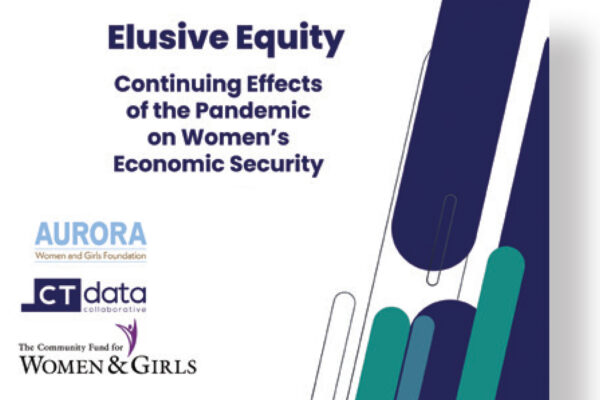
Elusive Equity: Continuing Effects of the Pandemic on Women’s Economic Security (2023) was created by CTData Collaborative and funded by Aurora Women and Girls Foundation and the Community Fund for Women & Girls.
PANELISTS
Emily Byrne, Executive Director, Connecticut Voices for Children
Karen DuBois-Walton, President, Elm City Communities
Karen Lott, Executive Director of the Women’s League Child Development Center
Michelle Riordan-Nold, Executive Director, CTData Collaborative
Jenny Steadman: Executive Director, Aurora Women and Girls Foundation
MODERATOR
Khalilah L. Brown-Dean, Ph.D., host, CT Public's Disrupted podcast
EVENT SPONSOR
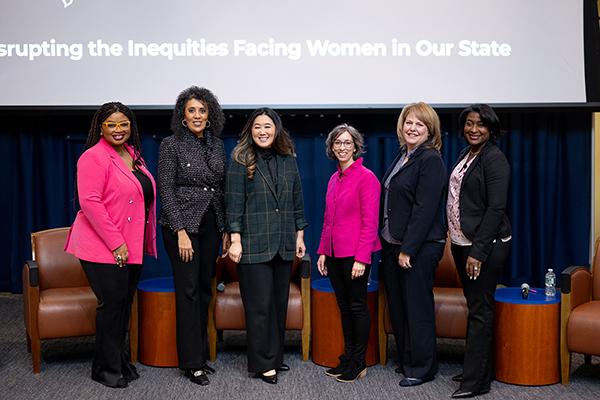
EVENT RECAP
As she began taping her show before a live audience, CT Public’s Disrupted podcast host Dr. Khalilah Brown-Dean decided to go off script. She asked those in the audience at Quinnipiac University, “How many of you feel like life’s really busy right now? How many feel like life is really heavy, lots of tension, turmoil …”
Hands went right up.
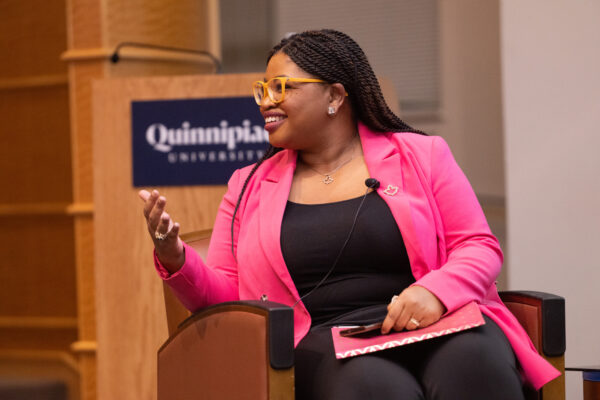
“Let’s take a moment to take a deep breath because we have the opportunity to learn about this important report and the many ways women and girls are struggling in Connecticut, but also women and girls are thriving — not because of, but in spite of some of the forces organizing against them,” she said.
The radio show and podcast discussion focused on the CTData Collaborative’s report “Elusive Equity: Continuing Effects of the Pandemic on Women’s Economic Security.” The study was a follow up to “Essential Equity: Women, COVID-19 and Rebuilding CT,” a study released in 2021 which examined the impact of the pandemic on women and girls.
“Elusive Equity” was commissioned and funded by the Community Fund for Women & Girls and the Aurora Foundation to gather data to see “how women and particularly women of color are navigating the post-pandemic economic landscape.”
Brown-Dean said she hoped audience members would walk away asking “What can I do? What can we do?” to make change around the issues highlighted in the report.
Panelists echoed that charge. DuBois-Walton said it’s vitally important people have access to fair wages, affordable, inclusive housing and affordable childcare allowing them to “pay for other things, to have fun and joy. All of that is part of a life and that should be available to at any income.”
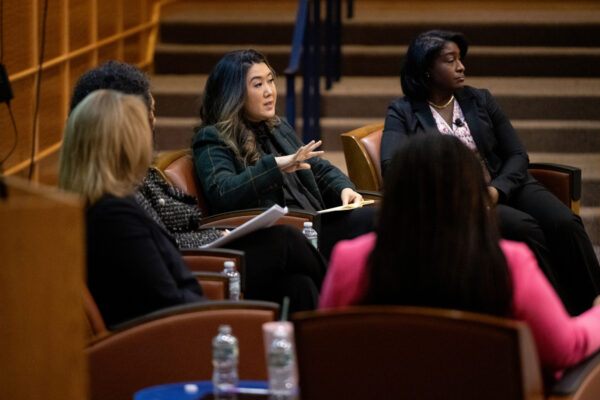
“I would remind us we are not without agency,” Byrne said. “We have the choice to make Connecticut a better state. Women are just simply amazing. We’re industrious, resilient, caring and even when systems are designed to keep us down, we figure out a way to rise above them. Imagine what we could do if the decks were stacked for us, that’s the message we should all be sharing when we talk about policies that support women."
WHAT WE HEARD
Panelists highlighted the strong lingering effects of the pandemic on women’s economic security and the depth of the inequities:
• Lack of Affordable Housing – DuBois-Walton said incomes aren’t rising as quickly as rents, particularly in Black and Brown households. Elm City Communities/The Housing Authority of New Haven houses and serves 6,000 families and 30,000 families are on the waiting list.
• Wages – While panelists applauded the effort to raise minimum wage to $15 an hour, DuBois-Walton said a New Haven County resident would need to earn at least $30 an hour to afford a modest two-bedroom apartment.
In the low wage category, women earn 93 cents on the dollar compared to men but in medium wage-earning positions, white women earn 78 cents on the dollar compared to men, Black women earn 65 cents on the dollar and Latine women 70 cents. “The larger gap is due in part to occupational segregation with white workers disproportionately occupying higher wage jobs,” Byrne said.
• Evictions – From 2019 through the end of 2022, landlords in CT filed a total of 98,177 eviction cases and close to 50,000 of the defendants were women who are more likely to be heads of households in rental housing. CTData Collaborative found that evictions had a disproportionate impact on women of color.
• Poverty — Levels are persist with 11 percent of women in the state living in poverty. In cities including Bridgeport, New Haven, Hartford and Waterbury, the poverty rate for women nearly doubles. Thirteen percent of all girls under 18 live in poverty and the percentage jumps to more than 35 percent in a number of CT cities.
• Childcare – there are fewer spaces available for children – as the total spaces dropped by eight percent – and the total number of licensed childcare facilities also decreased. Of the parents who earlier reported leaving the workforce to take care of children during the pandemic, 34 percent had not fully returned to work at the time of the survey.
• Higher education – a bright spot in the report found that 60 percent of students pursuing bachelor’s degrees in the state are women and 63 percent of master’s degree students state are women. However, Brown-Dean pointed to the realities of crushing student loan debt.
WHAT WE ALSO HEARD: Reasons to Be Hopeful
- Lott said Governor Ned Lamont established a Blue-Ribbon Panel on Childcare whose members represent teachers and leaders in early childhood education through higher education as well as parents who are “working to develop a childcare system that works for families, providers, and the state’s economy. LEARN MORE
- Byrne said many nonprofits and organizers all over the state are working to address issues highlighted in the report and she noted that Connecticut passed a transformational initiative – Baby Bonds. Connecticut was the first state to create a program that invests directly in the nearly 15,000 children born into poverty each year. LEARN MORE
- DuBois-Walton said Elm City Communities/New Haven Housing Authority has entered into an agreement to buy vacant property across from Union Station to build mixed use-affordable housing.
WHAT WE CAN DO:
• Get involved in politics, especially on the local and state levels.
• Advocate for fair wages for women and for affordable housing and childcare.
• Support women and girls-focused philanthropic organizations. Steadman said that when she talks about why it’s important to support women and girls’ funds, she shares “an appalling number” – that 1.8 percent of charitable dollars across the US (of $385 billion charitable dollars) are targeted to programs serving women and girls.
• Stay hopeful. Each panelist said that while they see great inequities, they also see progress and they have hope. Karen Lott, for example, said that thanks to funding from the Aurora Foundation, staff members at the Women’s League Child Development Center staff pursued associate and bachelor’s degrees and have gone on to become public school teachers.
• Encourage young women to continue to speak out on issues that matter to them, to fight for change, and to consider seeking elective office.
RESOURCES FOR YOU
Elusive Equity: Continuing Effects of the Pandemic on Women’s Economic Security Report (2023)
Aurora Women and Girls Foundation
The Community Fund for Women & Girls
Connecticut Voices for Children
CTData Collaborative
Disrupted podcast on CT Public
Elm City Communities
Women’s League Child Development Center
Presented in partnership:
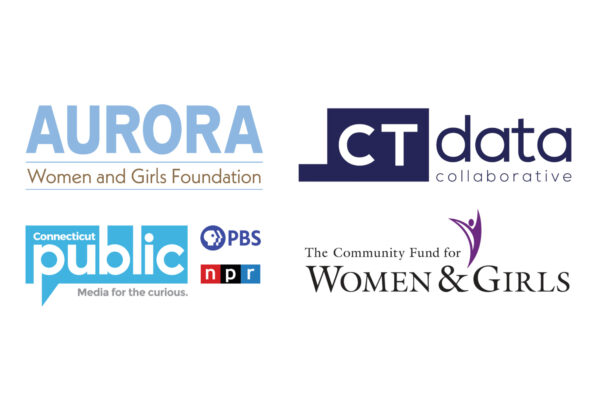
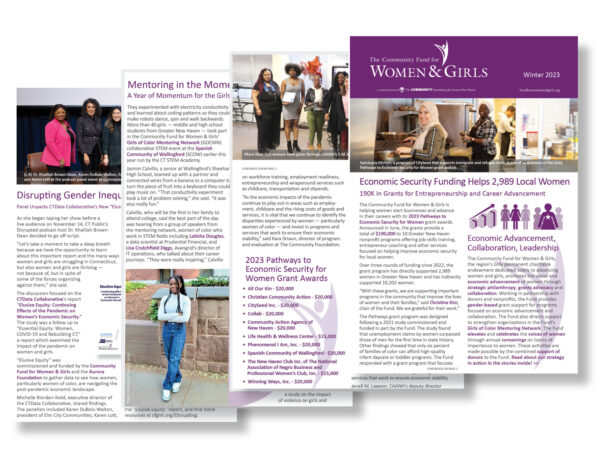
This story is included in the Winter 2023 edition of the Community Fund for Women & Girls' newsletter.
